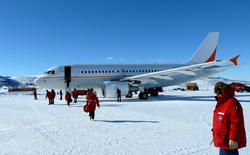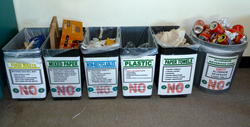After another two days of delay in Christchurch, we finally made it to the ice! We were only the sixth group of scientists traveling this year to McMurdo Station on the Airbus A319. Operated by the Australian Antarctic Research Program, the A319 is a luxurious form of transportation compared to traveling on military transport planes which has been more typical in the past.
Being “on the ice” is qui te the transition from the brisk spring time weather and lackadaisical days in New Zealand to 24 hour sunlit-16°C (3°F) days and the hustle bustle jumping to the beat of science here at McMurdo Station. There’s always something that needs to happen or be done. Besides the normal unpacking and setting up the lab and preparing for experiments the old scientists are back in school! You never stop learning. There are numerous courses that we must take: Safety training for using the laboratories, environmental awareness education for the surrounding areas, operating procedures for working in the McMurdo Dry Valleys Antarctic Specially Managed (protected) Area, training for high altitude activities, the Sea Ice Course for traveling on the frozen ocean, learning how to use the Hotsy drill for making holes in the ice-covered lakes, helicopter training, courses in communications, driving vehicles and ATVs, including snow mobiles on both sea ice and mountains, and most importantly the overnight Snow Camp 101 to learn basic skills for surviving in the cold Antarctic Climate including pitching tents, building igloos, melting ice for drinking water, and even handling the “waste” from normal human digestive activities. Yes, ALL waste must be collected; we try to leave no trace of our presence in the pristine and delicate environments we’re working in. All this in preparation for our adventures into remote field sites.
te the transition from the brisk spring time weather and lackadaisical days in New Zealand to 24 hour sunlit-16°C (3°F) days and the hustle bustle jumping to the beat of science here at McMurdo Station. There’s always something that needs to happen or be done. Besides the normal unpacking and setting up the lab and preparing for experiments the old scientists are back in school! You never stop learning. There are numerous courses that we must take: Safety training for using the laboratories, environmental awareness education for the surrounding areas, operating procedures for working in the McMurdo Dry Valleys Antarctic Specially Managed (protected) Area, training for high altitude activities, the Sea Ice Course for traveling on the frozen ocean, learning how to use the Hotsy drill for making holes in the ice-covered lakes, helicopter training, courses in communications, driving vehicles and ATVs, including snow mobiles on both sea ice and mountains, and most importantly the overnight Snow Camp 101 to learn basic skills for surviving in the cold Antarctic Climate including pitching tents, building igloos, melting ice for drinking water, and even handling the “waste” from normal human digestive activities. Yes, ALL waste must be collected; we try to leave no trace of our presence in the pristine and delicate environments we’re working in. All this in preparation for our adventures into remote field sites.
Even life in McMurdo requires learning and adapting. Meal times are routine so one begins to schedule their days around food. But because of 24 hours of sunlight, when is bedtime? When and how do you get exercise when it’s so cold outside? And where do you throw away your dental floss? Every bit of trash is sorted (see picture), packed and shipped off the continent: there are no landfills to contaminate our soils, no burning of trash, and no compost piles to decompose food wastes. Life here in McMurdo is not like home.
Greetings from Brad Tebo (Bravo Tango)
Created by Hubert Staudigel on Sunday, 31 October 2010 and updated on Friday, 3 December 2010

